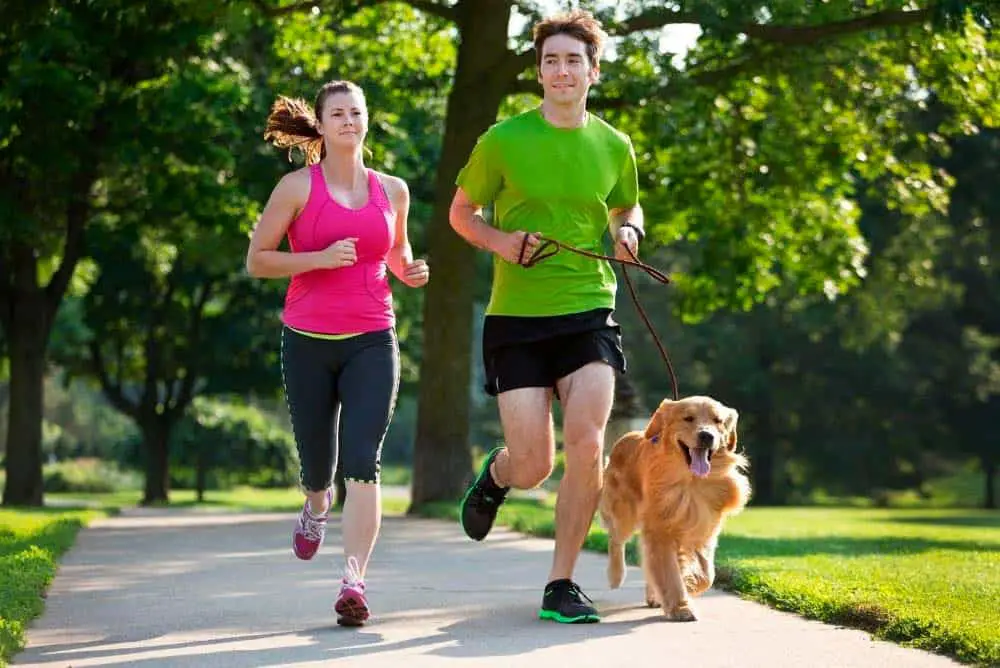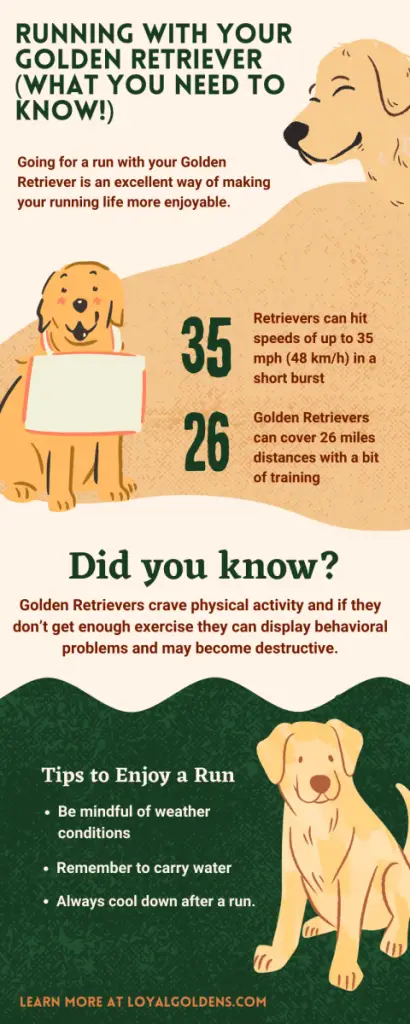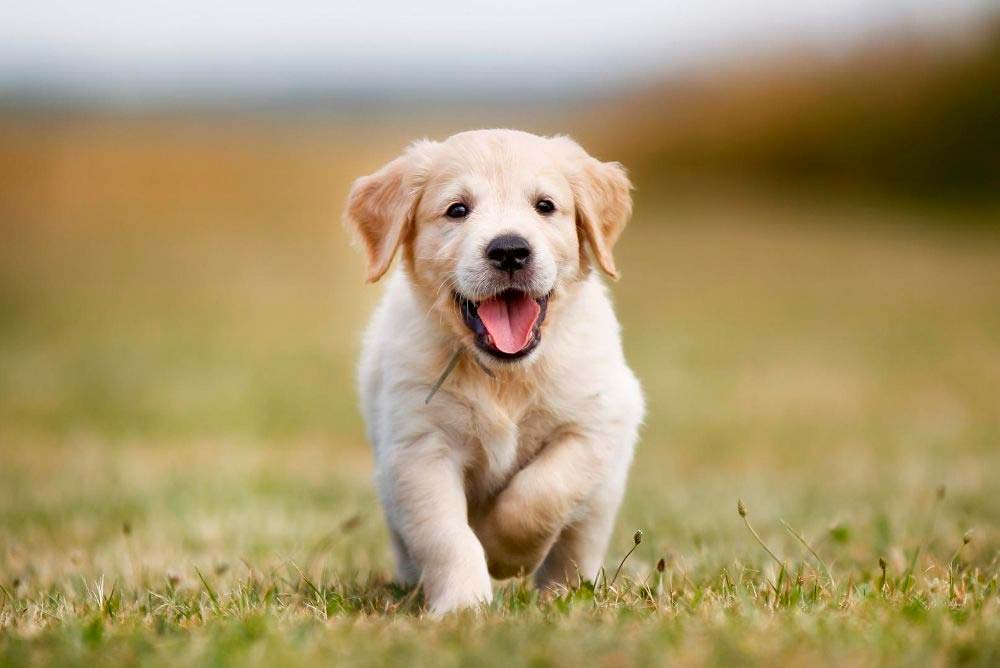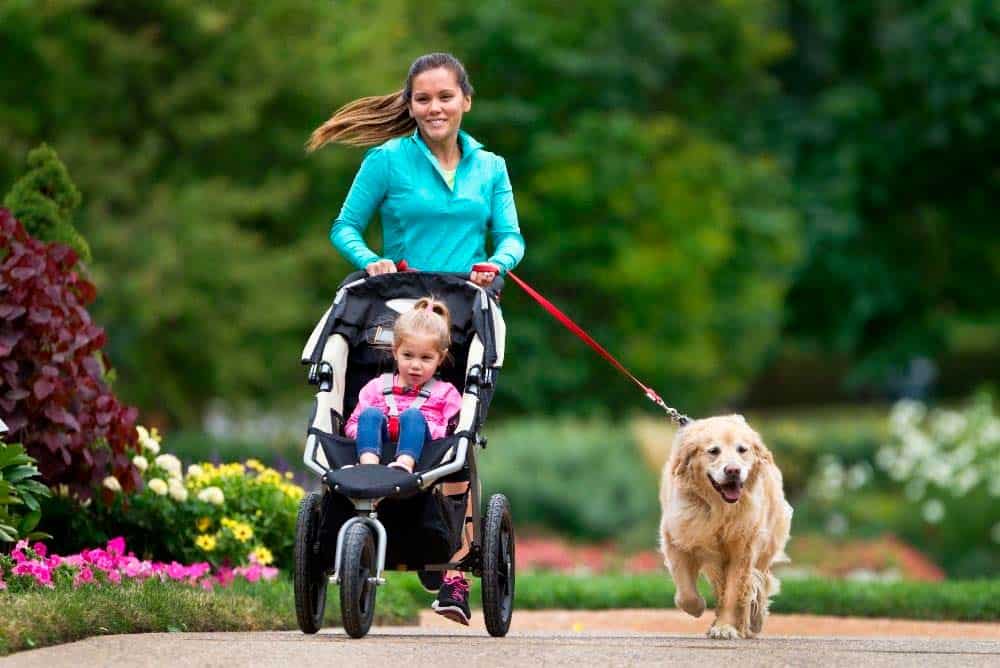Going for a run with your Golden Retriever is an excellent way of making your running life more enjoyable. If you’ve been a runner for a while, you’ve probably realized that finding the ideal running partner can be a challenge, especially if they’re not as motivated about running as you are. However, there is one partner who never disappoints – you guessed it – it’s your furry best friend – your golden retriever.
Running with your Golden retriever not only improves your health, but also that of your dog. Goldens love to run and you will not find a better running partner anywhere. But before starting to run with your pup, it is essential to consider their age and physical conditioning.
The rest of this article will discuss what you need to know when running with your golden retriever. We’ll look at their characteristics, how fast they run, how long they can run, and factors to consider before going for a run with your dog.

(This article may contain affiliate links and loyalgoldens may earn a commission if a purchase is made.)
Unlock your goldens natural intelligence and see just how quickly problem behaviors disappear.This is the best at home dog training I've ever used!
Can You Take Golden Retrievers Running?
The short answer to this question is – yes. The characteristics of the golden retriever breed make them unique and well adapted to running. They are high energy pets, bred to run and retrieve stuff from different environments like water, tall grasses, and fields. The retrieval characteristic, in particular, makes them ideal candidates for jogging and running partners.
Moreover, inheritable traits such as a well-balanced body, deep chest, long and muscled legs make the golden retriever breed perfect for running. Their constant desire to please also makes them easier to handle compared to most breeds. In addition, the increased physical activity will do your golden good both in terms of their health and overall happiness.
What Makes Golden Retrievers Amazing Running Buddies?
Golden retrievers were initially bred as work dogs. Their history dates back to more than 150 years ago when they were human companions in hunting for food and searching for targets. They were used to retrieve fallen game for hunters in the Scottish Highlands. So when they bred the golden retriever, they made sure to create a sturdy breed with lots of stamina.
They needed a dog that could travel through a mountainous landscape littered with ponds, streams, and lakes–a physically demanding task. The result was a dog that could easily run long distances, hike, and swim for the better part of the day. Golden retrievers are more than happy to swim and run around in fields all day hunting for birds.
While most family golden retrievers are not required to perform such hard tasks, they are still genetically tailored to go the distance. Their love for retrieving things and running makes them ideal running partners. Their warm and social personalities also make for more enjoyable runs. They are equally good on short jogs as they are on longer runs.
How Fast Can a Golden Retriever Run?
Now you might be wondering, how fast can your golden retriever run? Well, golden retrievers can hit speeds of up to 35 mph (48 km/h) in a short burst. However, the running speed is an individual characteristic that can vary from one dog to another. While a retriever’s speed is not comparable to that of a greyhound, it is more than sufficient for a running partner.
Your retriever’s speed is influenced by factors such as breeding background, age, physical fitness, and overall health.

How Long Can a Golden Retriever Run?
Just like humans, there isn’t a standard answer to this question. A golden retriever’s limit will vary and depend on a wide range of factors. For example, older retrievers can’t run as far and as long as young dogs. Similarly, an overweight dog won’t run as far as a dog with the optimal weight.
Rest assured, with plenty of regular training, your golden retriever could run a marathon with you.
Considering your ordinary marathon is about 26 miles (42 kilometers), most golden retrievers can cover such distances with a bit of training. Slowly train your pooch to run and don’t expect it to run 5 miles (8 kilometers) on the first day and 12 miles (19 kilometers) on the second day.
It’s great if you’re both starting longer distance running together because both you and your golden will be starting from closer to the same spot in terms of ability. If you’re already an advanced runner, however, be sure to start out with your dog on shorter runs and work your way up to longer distances. It won’t be long before he will be leaving you in the dust.
When your dog starts lagging and panting excessively, take a break. It’s not worth hurting your furry friend just to train for a marathon.
What Age Should You Start Running With Your Golden Retriever?
Age is a significant factor that influences how well dogs run. Golden retriever puppies, for example, cannot run long distances and for extended periods. That, however, changes as your dog gets older and gains more stamina.
Taking your puppy for extended runs can significantly stress their developing bones and paws. Running at an early age may also cause joint disorders such as hip dysplasia.
Golden retrievers are generally ready for longer runs when they are about 12-18 months old. At that age, your dog’s bones are mature and can withstand significant stress levels. However, it is prudent to have your vet inspect your pet’s fitness and bone strength before taking them for long runs and jogs. When your golden retriever reaches maturity, you can take your pooch for runs without cause for concern.
Training Your Golden Retriever Puppy for Runs

Discover how to train your Golden Retriever by playing games: 21 games to play with your Golden that will make them smarter and better behaved!
While it might not be possible to take your golden retriever pup for long runs, you can begin training it for future runs. The training doesn’t have to be rigorous. You can start the training slow and gradually to accommodate your pup’s delicate bones and joints. Some of the valuable lessons that your puppy should get include:
Exposure to Distractions and Noises
While on runs, your golden retriever is likely to encounter numerous distractions and loud noises. Such experiences can alarm your pet, lead to nervousness, and cause erratic behavior changes. It is good to expose your pup to various noises before reaching a running age to avoid such erratic behavior.
Socialization
It is essential to regularly take your puppy outdoors to familiarize themselves with the outside world. That way, nothing will surprise your golden retriever when you finally begin going for runs.
Recall Commands
When you are out with your dog, it is essential to let it off the leash. But to safely do so, you need to recall your dog from time to time when they get distracted. Training your dog at an early age and establishing recall commands can be crucial when you begin going for jogs.
Brain Training for Dogs is a great way to meet these requirements and get your puppy ready to run with you. It’s a fun and easy way to train your dog and it also has the added benefit of creating a strong bond with your new puppy. This works great with adult dogs too!
How Can You Make Your Retriever Run Faster?
If you are new to running with a golden retriever, you probably might be wondering how best to synchronize your running speeds. If you prefer a fast-paced run, you might want your dog to run faster to keep up with your exercise needs. To do that you need to do the following:
- Prepare your pet for long runs gradually with plenty of training.
- Gradually increase speed and endurance training.
- Use encouragement and right commands to encourage your pooch.
- Provide a healthy and nutritious diet for your dog. A healthy diet ensures that your dog is fit for high endurance runs when called upon.
- If your pet is suffering from obesity, help them cut down their weight.
- Give your dog a treat for every single success. Treats help encourage your dog to do better.
What Happens When Your Golden Retriever Gets Older?
You may have heard that dogs age faster than people, unfortunately it’s true. Like all living beings, old age significantly affects how well we can perform physical activity. Would you recommend a marathon to a 70-year-old person without considering their overall health? Probably not. The same applies to golden retrievers. You need to keep monitoring their health and should probably stay away from long, intense runs.
If you want to begin going for runs with an older golden retriever, you should gradually introduce them to your running routines. A slow pace is recommended in the introduction phase. Your dog’s muscles take time to get ready. The gradual introduction also helps your golden retriever gain the needed strength for runs and jogs.
As your pooch begins to grow older, there are several factors that you need to take into consideration. With old age, muscles start to weaken, and it might not be able to perform lengthy runs and jogs as you used to.
Let your dog’s behavior guide you. For instance, if your golden is more wiped out after a run than they used to be, it may be time to dial it back a bit. Anyone who’s had an older golden knows their minds are generally more ready to go than their bodies.
Your dog can’t directly tell you when they’re hurting. It will be up to you to know by carefully watching their reactions and behavior. With a very elderly dog, you should consider keeping physical activity to a minimum.
Always Consult a Vet

You also need to take your golden retriever for regular check-ups to your favorite vet. Regular check-ups ensure that your dog does not have any problems with their joints, bones, and stamina.
A common condition among older dogs is hip dysplasia. The condition causes considerable pain and suffering to your pooch. If not addressed, it can get aggravated by intense jogs and runs.
You should also talk to your vet about getting your pet some supplements to improve its joints. Some golden retrievers may start to slow down when they hit their 8th birthday, while others can stay active at their 12th birthday and beyond.
It is important to note that retrievers are breeds that love to please. If you ask too much from them in old age, they might overwork themselves and hurt their health.
Continuously monitor your dog, and if they seem to be getting shortness of breath, aches, and pains, then it might be time to take a rest. Older golden retrievers might still enjoy taking walks and swimming but avoid making them jump hedges or dragging them on the run for an hour straight.
Taking an Obese Golden Retriever for a Run
If your golden retriever is overweight, starting-off with an intense run or running long distances is not advisable. An overweight dog can experience a variety of health issues while on fast and long runs.
A common issue you might observe is breathing problems. You should make sure your dog attains a healthy body to weight ratio as advised by the vet. Start-off with jogs or low intensity runs to help your furry friend lose weight before going for regular runs in the park.
Pets that put on more weight due to their genes need special care. They need to eat a healthy diet and stay active. These two pillars of weight management will help you keep your golden retriever healthy and happy. You should also consider asking your vet to prepare a diet plan for your pet.
Running With Your Golden Retriever on a Leash
When you go out for your first run, you’ll want to enjoy that blissful experience with your dog. Therefore, it’s a good idea to have your pet trained early to jog or run beside you on a “loose” leash.
Being pulled along while running is not fun. Distractions may become a problem when you start going for longer runs.
To deal with the challenge, always carry treats. A yummy treat can help you get back your dog’s attention. That way, you can go back to enjoying your run without too much hassle.
A leash allows you to have full control of your pet in the course of the run. You might even want to consider a hands free leash like this one on amazon.
Once your Golden Retriever is accustomed to the jog/run routine and the environment, you can consider letting them off the leash from time to time when allowed and appropriate.
Why Going for Jogs Is Important for Your Dog
Golden retrievers always crave physical activity. If they don’t get enough physical exercise, they store up the unused energy, get bored and ultimately find a release for the pent up energy. At this point, golden retrievers may get agitated and often become destructive. They begin digging, chewing on stuff, and running around uncontrollably.
It’s hard for them to behave themselves when they are in this state. Some even try to escape from their homes. You will probably hear people who don’t take their dogs for walks, jogs, and runs complain about their dog’s bad behavior.
Running with your golden retriever is a great way to release their pent up energy!
Considerations Before Going for a Run With Your Golden Retriever
Golden retrievers are natural runners and enjoy physical activity. Going on runs in public spaces is, however, quite a different story. So before going on that run, here are some factors that you need to consider:
- Select a running space that has limited disturbance such as noises, strangers, and other animals. Where possible, use an open yard or a wide road. Interference and distractions can affect your dog’s mood and, in some instances, make them nervous.
- Get your dog accustomed to a collar for their first couple of runs. Or better yet, instead of a collar use a comfortable harness like this popular one on amazon.
- Make sure your pet is in good health condition. If possible, consult your vet for an expert opinion on their fitness levels.
- Socialization and early obedience training are a must before going on a run. Here is the best training method I’ve found to have more fun and create a better bond with your pooch.
Tips to Enjoy a Run With Your Golden Retriever
Now that you know you can go for a run with your golden retriever, here are a few tips on how to make your run or jog enjoyable:
- Always start by getting warmed up. Before any rigorous physical activity, a proper warm-up is essential because it helps prevent injury by loosening joints and elevating the body’s muscle temperatures. Warmed up muscles have a higher energy production rate that increases muscle reflexes and reduces the time needed for muscle contraction.
A proper warm-up should begin with gentle exercise.
- Be mindful of weather conditions when planning your jog or run. Dogs generally do not handle hot and humid conditions well.
- Remember to carry water when going for long runs and allow your golden retriever to quench their thirst regularly.
- When your golden retriever starts panting excessively and lagging, take a break. Slotting-in frequent breaks in your run or jog help recharge your body. Your dog also needs to recharge, and this could make runs more enjoyable for both of you.
- Every once in a while, let your golden retriever off the leash in safe open spaces. However, before letting it run off the leash, make sure it’s legal to do so in a particular area. Also, have a reliable way of recalling your pooch.
- Always cool down after a run. A cool-down is an essential part of a workout. It allows both the breathing and heart rate of the pooch, as well as your own, to return to normal. It also helps promote a sense of relaxation and well-being.
A cool-down routine after a jog should involve a brisk walk for 2-3 minutes that gradually transitions into a stroll. A great way to end the walk is by doing a few stretches while letting your golden roll around in the grass!
Running With a Golden Retriever – Conclusion
Golden retrievers are excellent running and jogging partners provided you give them plenty of proper training before you start your regular runs. They can potentially run long distances, but you should not expect them to achieve this immediately. While they are undoubtedly good runners, unlike humans, they have little concept of their limit until they reach it.
Therefore, it’s essential for you to pay close attention to your pet at all times. Remember to consider things like the weight and age of your dog before going for a run. You also need your vet to check the health of your pet and the proper diet regime.
More Golden Retriever Articles You’ll Love!
- How Fast Can a Golden Retriever Run? (Hint: It’s FAST!)
- Can Golden Retrievers Live in Hot Climates? (The Facts!)
- How to Fly With a Golden Retriever (Essential Travel Tips!)
- How Much Space Does a Golden Retriever Need? (Explained!)
Sources
- Google Play Books: How to Understand and Train Your Golden Retriever Puppy Or Dog
- Google Play Books: Golden Retrievers: A Practical Guide for Owners and Breeders
- Google Play Books: Golden Retrievers For Dummies
- Golden Retriever: Smart Owners Guide
- BetterHealth Channel: Running and jogging – health benefits
- Verywell Fit: The Benefits of a Cool Down After Exercise
- Fitness19: 3 Reasons Why Warming Up Is Important
- American Kennel Club: Hip Dysplasia In Dogs
